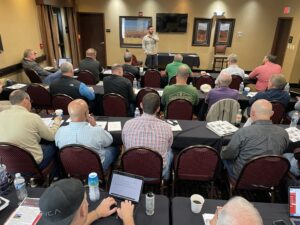
NEW ORLEANS (BP)–For many years the editor of The Wall Street Journal was a Tarheel by the name of Vermont C. Royster. That “C” in his name stood for “Connecticut.” And yes, all his siblings were likewise named for the states.
My wife and I were dining in a Birmingham restaurant some years back when I happened to notice that our waitress’ name was Auburn. Being the type who likes to jest with the help, I said, “I’ll bet you have a sister named Alabama.”
She said, “I have two sisters — Tulane and Cornell.” I shrank back into my chair, certain that she was putting me in my place.
“I have four brothers,” she said. “Stanford, Harvard, Princeton and Duquesne.” For once, I was completely speechless.
“My father’s name is Stanford and my mother is Loyola. They’re from Baton Rouge and were engaged before it occurred to them that they each had colleges as names and decided to do this to their children.
“When we were little,” she said, “we were on the front of Parade magazine, on Art Linkletter’s ‘House Party’ and in ‘Ripley’s Believe It or Not.’”
When she told me she was married with two children, I said, “Wait a minute — let me guess your husband’s name.” Gardner Webb or Truett McConnell. Something like that.
“My husband is Ron Harris,” she said, “But my children are Agnes Scott and Slippery Rock.” She hastened to add, “I’m kidding about those.”
I once told that story to a professor at Agnes Scott who had a contribution of her own to this tale. “On the first day of class, when teachers don’t have a roll yet and have to circulate a sheet of paper for everyone to sign, invariably some student makes up a fictitious name. Well, I’ve learned to read ahead of the name I’m calling so I don’t fall for that. That’s when I spotted the ringer. I said to the class, ‘Who made up the stupid name?’ No answer. Then I said, ‘Alright, who is this States Rights Constitution Finley the Third?’ And someone raised a hand. I said, ‘That’s your name?’ It was. And just think — there’s two more of those running around.”
Mary Lou Sumrall worked the welfare office in Columbus, Miss., for years. Once she was helping a client fill out an application. Name? “Ninthamay Terry.” Excuse me — what? “Ninthamay Terry.” How did you get that name? “I was born on the ninth of May.”
That’s one person who ought to give thanks every day she didn’t arrive on the 23rd of September or some such.
Names are strange creations. Composed of letters of the alphabet and given certain sounds, the voicing of which represents a living, breathing human being. Utter those sounds and someone in the room — just one, the same one every time — will turn in your direction and say, “Yes?” Stand at the edge of a crowded children’s playground and utter the sounds that represent your child and do it loudly, and yours will cut out of the herd as clearly as though a cowboy on a pony had separated him.
Nothing else sounds like or as good as our names.
One aspect of the Old Testament many people find fascinating is the practice of changing names. A fellow would begin life with one handle and later, as his character blossomed or his identity became fully known, the family or society or even the Lord Himself would give him a new name.
Abraham started out life as Abram, and his wife Sarah started as Sarai. He went from “exalted father” to “father of many people,” while her name appears to be “princess” both ways.
Abraham’s grandson Jacob received his strange name as a newborn when he reached over and grabbed hold of his twin’s heel. His parents, Isaac and Rebekah, dubbed him “Heel-holder,” which came to mean “someone who gets a free ride on the other fellow’s dime.” In time, as God began to mold Jacob, He changed the name to Israel meaning “one who strives with God.” Seems to me the Lord was saying He’d rather have a son who fights Him than one who takes advantage of his brother.
Peter started life as Simon. Since the new name means “Rock,” I always wanted the old name Simon to mean “Sand” or maybe “Cream Puff.” No such luck. According to my Bible dictionary, Simon came from the Old Testament “Simeon” and may have been a form of Samuel.
Now, Samuel — there’s a name with a good story behind it. When Hannah prayed for a child to end her barrenness and the harassment she was being subjected to by her husband’s other wife, God heard and answered. In appreciation, she named the little boy “Sha-mu-el,” because, she said, “I have asked him of the Lord.” But Samuel does not mean “asked of the Lord”; it literally means “heard of the Lord.” The child’s very name was “God answers prayer.”
In the Bible, your name is who you are. It’s not just a handle, your identity, but your reality. That’s why names were so crucial.
God knows your name. He knows the syllables you respond to and He knows the reality of who you are. “I have called you by name,” He says in Scripture.
Every child sooner or later asks Mom and Dad why they were given the names they ended up with. When my maternal grandmother was born in the early 1880s in rural Alabama, the practice was to give a child the names of all the visitors the day of her birth. That’s how Sarah Louisa Martha Tabitha Noles got her name. And why Grandpa called her “Sally,” I suppose.
My oldest brother Ron was named for Ronald Colman, everyone’s favorite movie star in 1935. When I came along, the Joe (alas, not Joseph) came from her uncle Joe Noles and middle name Neil for her cousin Neil Barker. Anyone calling me “Joe Neil” is immediately recognized as a relative who has known me from the beginning.
In Bible days, the faithful Jews deemed the name of God so holy they dared not pronounce it lest they be guilty of taking His name in vain. To protect the sanctity of that name, when one was reading Scripture and came to the written form of the name, he would simply insert “Lord” or “The Name.” Eventually, they forgot even how to pronounce the Lord’s name. When we say “Yahweh,” it’s our attempt to do what they dared not — pronounce the Lord’s name. Why we rush in where they feared to tread is anybody’s guess.
Jesus, who knew better than anyone the specialness of God, taught us to pray, “Our Father, who art in heaven, hallowed be thy name.” Hallowed. Holy. Something very special and unlike everything else. That’s our Father.
No language can tell the wonders of our Lord. No earthly name can hold all He is. We stand in awe of this One who made heaven and the earth, then revealed Himself to His creation in Jesus Christ.
No one who knows Jesus Christ and the heavenly Father would ever, ever use the sacred name in a profane or harsh manner. Let us approach Him with reverence and speak His name with respect.
In heaven, forget your earthly name. God gives you a new name (Isaiah 62:2 and Revelation 2:17, among others). He makes all things new for you through Christ and fittingly gives you a new name. New reality, new identity — you need a new name. The reality of heaven will be so far above the kind of earthly existence we’ve known that only an entirely new language can contain it. We’ve about used this one up.
–30–
Joe McKeever is director of missions for the Baptist Association of Greater New Orleans whose cartoons are featured on BP Lighter Side. His website is www.joemckeever.com.















